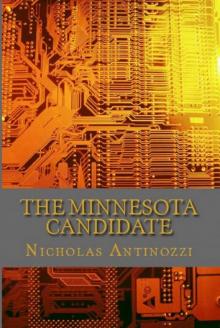- Home
- Nicholas Antinozzi
Bunkers Page 7
Bunkers Read online
Page 7
June nodded. “Not so much for myself, more for my children and grandchildren.”
“You can never be too careful.”
“No,” said June, giving him a wink, “you can’t,” she then stared down at the two stacks of books and shook her head. “Will you excuse me for a moment?” she asked.
Mark shrugged and watched as the older woman gracefully slipped out from behind the register, before disappearing into the bookstore. Mark thought she must be gathering up some cartons for his books, but when she returned, she held two thick paperback books. “What have you got there?” he asked.
June handed him the books. “Do you already have these?”
Mark shook his head as he read the covers.
“Trust me,” said June. “You want them.”
Mark smiled. “Thank you,” he said. “I’ll take them.”
June packed Mark’s purchases into cardboard boxes and called up a young male sales associate on the PA system. “We need the two-wheeler,” she said to the high school age boy. The boy nodded and walked away.
Mark paid cash for his books, which surprised June. “Sorry,” he said, “but I don’t believe in plastic.”
“You’re a smart man,” she said, handing him his receipt. “I don’t either.”
Mark counted out ten crisp one hundred dollar bills. He folded them in half and handed them to June. “This is for you,” he said.
“Oh, I couldn’t,” said June, reaching out to try and return Mark’s generous tip.
“Oh, yes you could and you will. I want you to have that. You might have saved my life by recommending those books. I appreciate that.”
June made a sad face and she clutched the money to her bosom. “I don’t know how to thank you,” she said.
“You just did.”
The sales kid showed up and he stacked the four cartons on a green two-wheeler. Without even acknowledging Mark, he began to wheel them to the door.
“For what it’s worth,” said June. “I’m terribly sorry about what happened to your family.”
Mark froze. His voice got caught in his chest and all he could do was nod.
“I never forget a face,” said June. “I’m guessing this is insurance money?”
“Something like that,” replied Mark. “Thank you.”
“God bless you.”
Mark followed the kid out of the store, his mind churning with good and bad memories. When they were outside, Mark pointed to his battered Ford pickup. The kid stared at him as if the truck were parked a hundred miles away. He then wheeled the boxes out to the Ford and pulled the two-wheeler out from under them. He grunted a thank you and turned to leave.
“Hold on,” said Mark, digging into his pocket. He pulled out a rumpled dollar bill and handed it to the kid. “Don’t spend it all in one place,” he said.
After loading his books into the back of his truck, Mark drove over to Radio Shack. Once again, Mark found the sales associate to be friendly and knowledgeable, but unfortunately, they didn’t have what he was looking for. The salesman pulled out his wallet and removed a worn business card. “This is the guy you need to see,” he said. “Tell him that Doug sent you.”
“I’ll do that,” said Mark, pulling out his own wallet and handing the man a fifty dollar bill. “Thank you.”
“Awesome,” replied the smiling clerk.
The address on the card was several miles away, but the traffic was light and Mark knew the neighborhood. The houses here had all been built in the early seventies and most were either ranch style or split levels. The house on Able Street was a ranch style, in need of both a new roof and a fresh coat of paint. Mark parked the truck and stepped outside. The gray sky made him wonder if he should set his books inside the cab. The wind was starting to pick up and the temperature had already dropped ten degrees since he had left the house. He paused for a second, but decided to risk it. He didn’t even know if the man on the card was home. Mark walked up the crumbling sidewalk and climbed the four steps to the front door. He then knocked and waited. He then tried the doorbell, but heard nothing.
“Shit,” he muttered, before turning to leave. He was already on the sidewalk before the front door rattled. Mark turned and waited as locks were turned. A nearly bald man appeared in the doorway. He was thin and there were dark circles under his piercing eyes. Mark thought he looked like a young, old James Taylor. He gave Mark a hard look, but said nothing. “Hi,” said Mark, uneasily. “Doug sent me.”
The bald man considered this. “From Radio Shack?” he asked.
“That’s him,” said Mark, nodding his head.
“Come on in.”
Mark climbed the stairs and waited as the man locked up behind them. The house was a complete disaster. The floor was strewn with empty beer cans and pizza boxes. Cigarette smoke hung in the air. The bald man waved him into the house, limping as he led the way through the living room and into the kitchen.
“Excuse the mess,” grunted the bald man. “My shop is downstairs. They call me Gadget, what are you looking for?”
“I would like to buy a ham radio,” said Mark.
Gadget stopped. “You and everybody else,” he said. “Afraid I can’t help ya.”
Mark sighed. In desperation, he pulled out his wallet and fanned a handful of hundred dollar bills in the air. “That’s a shame,” he said. “I was hoping you might have one for sale.”
Gadget stared longingly at the money and licked his thin lips. “Hang on,” he said. “I might be able to dig something up. Follow me.”
Mark, feeling relieved, followed Gadget through his filthy kitchen and guessed there was no Mrs. Gadget. The sound of country music called softly from the bottom of the wooden stairs. Mark followed the man down the stairs and into another world. The unfinished basement had been converted into a workshop, where everything was meticulously clean and orderly. Mark found that he suddenly had a different opinion of the man. Electronic gear of all kinds lined the shelves. Gadget led the way to a workbench at the far end of the basement. “Very nice,” said Mark.
“Thanks,” said Gadget. “I lost a leg in the war. This keeps me busy.”
“I’m sorry to hear that. Where did you serve?”
“I was over in Iraq.”
“What branch?”
Gadget’s eyes suddenly went wild. “I don’t want to talk about it. I don’t ever want to talk about it. Why do people always want to talk about war? What, do you think I enjoyed being over there?”
Mark held up his hands. “I served in the Gulf War,” he said.
Gadget scratched his bald head and nodded. “Yeah, I could tell you were military as soon as I saw you. That doesn’t mean I want to talk about the war; looks like we’re going to be fighting one right here, soon enough. So, you want a ham radio, huh? All I have is left on the shelf is this old Yaesu. This is an FT-1000D, if that means anything to you.”
Mark shrugged his shoulders. “I don’t know the first thing about ham radios, but I did buy some good books to learn with. It sure has a lot of dials and switches. Is it complicated to operate?”
“Gulf War, huh?” asked Gadget. “You see any action?”
“I saw plenty. I was part of the first wave, Desert Storm. I fought under General Boomer.”
“Ooh Rah,” said Gadget, smiling. “Semper Fi?”
“Semper Fi,” replied Mark.
“Were you with the First or Second Division?”
“I was with the First.”
Gadget nodded his head and returned his attention to the radio. “A lot of people like the new Yaesu FT 2000, but I’ve always been partial to these. This little girl is the best damn ham radio there ever was. I’ve got about a hundred hours into her. Want a beer or somethin’?”
“No thanks, I’m good.”
“Too good to drink with a fellow grunt, is that it?”
Mark held up his hands. “I think I will have a beer. Thanks.”
“Good.” Mark watched Gadget limp back to the stairs
. He then picked up a red plastic cooler and something else off a shelf. When he returned, Gadget set a pair of can coasters down on the workbench. “Use these,” he said. “And for God’s sake, don’t spill your beer. You ever kill anyone? And I don’t mean from a hundred yards away, I mean up close and personal.”
“I thought you didn’t want to talk about war?”
“Just answer the damn question!”
Mark felt something snap inside his head. He stuck a finger in Gadget’s chest. “I killed six men, just this close. I can still remember the looks on their faces as they realized they were about to die.”
“You never forget that, do you?”
“You sure as hell don’t.”
Gadget dug two cold cans of Schmidt out of the cooler and he handed one to Mark. “I see the faces of the men I killed in my dreams. My buddies who died, they’re in there, too. It’s getting to the point where I’m afraid to go to sleep.”
“You have to let it go.”
“Uh-huh, I’m trying,” said Gadget, returning his attention to the Yaesu. “So, this little girl is named Judy. She’s two grand, if you want her. The price is nonnegotiable. I expect you to take care of her; she’s a damn fine radio.”
Mark wanted to get out of that basement as quickly as possible. He pulled out his wallet and began leafing through his money. He counted it again and again, but he was fifty dollars short. “I’m sorry,” he said. “I only have nineteen fifty.”
The thin man’s eyes grew wide and they began to shift back and forth. “I said two grand, man. Did you lose your hearing over in the Gulf?”
“I tipped your buddy, Doug, fifty bucks when he gave me your card.”
“Are you bullshitting me?”
“Do I look like the kind of guy who would do that?”
Gadget shook his head, but pulled out a cellphone. A moment later, he had Doug on the line. As if Mark didn’t stand six inches taller, or outweigh him by a hundred pounds, Gadget got straight to the point. “Big guy,” he said, “looks Native American. Says he tipped you fifty bucks. Is that true?” Gadget raised his eyebrows and smiled. He then flipped his phone closed. “Nineteen fifty it is,” he mumbled, snatching the money away from Mark. “I’ll be right back.”
Tenderly, Gadget boxed up Judy, the ham radio, and he handed it to Mark. It seemed as if a light had gone out inside the man. Mark knew Gadget was suffering from a severe case of PTSD, but could do nothing to help him. When they reached the front door, Mark stopped to shake his hand. “Thank you,” he said.
“You need a license to operate one of those,” said Gadget, nodding to the carton.
With his free hand, Mark dug down the front of his t-shirt and fished out his dog-tags. “I already have a license.”
Gadget smiled, and then almost absentmindedly, he dug his own dog-tags from underneath his rumpled shirt. “Semper Fi,” he said.
“Semper Fi.”
Mark thought about the strange encounter all the way home. He found himself growing angrier by the minute, that the government was busy creating a new generation of PTSD victims. Long ago, Mark had grown to despise war. He felt that most wars were fought so the rich could get richer. He thought of poor Gadget, with his missing leg and scrambled brains, and wondered if the rich ever considered what became of men like him, after they had used him up. He shook his head and cursed. He knew the answer to that.
It was nearly 7:00 by the time Mark returned home. Jumbo was out on his front lawn, holding a garden hose over some pine saplings. Mark unloaded his Ford, feeling Jumbo’s eyes on his back. Not wanting Jumbo to become suspicious, Mark waved him over. Jumbo dropped the hose and began walking over. “I picked up some things in town,” Mark said. “I got some great books.”
“Reading is dumb,” said Jumbo. “I don’t waste my time. What else did you buy?”
Mark laughed. “I bought a ham radio. Do you have one?”
“A ham radio, huh? No, I don’t have one. We could use it to talk back and forth, couldn’t we?”
“And also to communicate with people a lot further away than that. You should really have one.”
“I’ll send Tiff into town, tomorrow. Where did you buy it?”
“I bought mine off of craigslist. You’ll have to shop around, those things are like gold.”
Jumbo shrugged. “I’ll put it on the list, but that list is getting pretty damn long and I’m the only one who seems to give a shit about it. Larry isn’t much help; oh, he talks big, but he never seems to be around when there’s work to do. His brother in-law, Glick, he’s a real piece of work. The son of a bitch lost his job, today. Did you hear that?”
Mark nodded his head. He didn’t like the direction this conversation was headed and he tried to change the subject. “They’re now saying the missiles were fired by terrorists. Did you hear that?”
“Yeah, we heard that. What am I supposed to do about Glick? The guy can’t pull his own weight. It isn’t fair to the rest of us that he just skates on in, ya know? I sunk my retirement money into that shelter,” he said, pointing to the woods. “And don’t start on me about going overboard. If we’re going to have to live down there, I wanted it to be someplace nice.”
“I never said you went overboard.”
“Maybe you didn’t, but Glick and Larry sure did. Poor Tiff has to listen to the damn sisters whining about how expensive everything is,” Jumbo sneered and raised his voice an octave. “Oh my God, do we really need two-ply toilet paper? Are you serious, we have to buy propane? We can’t afford that. But Tiff doesn’t say anything to those two. She’s got too much class for that. She waits for me to get home and then I have to hear about it. Just between us, I think I made a big mistake. I don’t think I can live with those people.”
“What about our deal?” asked Mark, narrowing his eyes. “I gave that land to all of you.”
Jumbo raised his hands up to his shoulders. “I know you did and I appreciate that. But I have a quarter of a million dollars sunk into that hole; and we’re not even close to being ready. That thing is gonna bankrupt me, and I’ve got Larry and Glick to thank for that. I should have never listened to them. What am I supposed to tell my family, huh?”
Mark had heard enough. “My dad used to say that a man should only gamble with what he can afford to lose. Those bunkers out there, they’re a gamble. We’ll probably never need them. Nobody held a gun to your head and made you sink that kind of money into that place. You did it on your own. The sooner you admit that to yourself, the better. Stop blaming your friends.”
Jumbo’s eyes grew angry, but then he began to laugh. “Friends,” he said. “What do you know about having friends?”
Mark wanted to punch Jumbo in the mouth, but he turned away and began to walk up to the house.
“Hey man,” said Jumbo, “I didn’t mean that. I’m sorry.”
Mark could feel his fingers trembling with anger. He knew if he said anything that it would only make the situation worse. As Jumbo pleaded for forgiveness, Mark walked up the stairs and into the house.
Chapter 10
For the next few days, Mark kept to himself. He watched out the window as a convoy of cement trucks rolled past his house. Mark hated to admit to himself how much Jumbo’s comment had hurt him. The truth was that he had always been a loner. All he had ever really cared about was his family. Now that his family was gone, he had finally gathered the courage to venture outside his comfort zone, only to be hurt.
Mark sat in front of his television and watched as the world seemed to crumble away. The internet would be unplugged at midnight and the protests had spread like wildfire. Israel had fired rockets into the city of Tehran and several skirmishes had been reported along the DMZ, between North and South Korea. American troops in Syria were suffering heavy casualties and the networks began scrolling the names of the dead at the bottom of the screen. President Crabtree was reportedly deep inside Cheyanne Mountain, living inside his bunker fortress. That didn’t stop him from issuing several
more Executive Orders. The first was to change the age limitations of the Selective Service. The maximum age was now thirty years old, and seventeen year-old high school dropouts were now deemed eligible for the draft. The penalty for dodging the draft was now an automatic life sentence, without any chance for parole. Aiding and abetting a draft dodger was now considered a felony, punishable by up to ten years in prison.
Mark had visited Bones and Dottie to deliver this terrible news. The two had taken the news with stone faces. “You can’t risk leaving here,” said Mark. “Not anymore.”
And while they both assured Mark that they would stay inside the shelter, he knew it was only a matter of time before they were caught. Jumbo now wore his NPS uniform all the time, usually with an AR-15 slung over his shoulder, and Mark had caught him peeking into the Kibble house. Jumbo had come over to apologize and Mark could see that the apology had been heartfelt. And while Mark had accepted the apology, he knew better than to trust the man.
Late Friday afternoon, Mark got up to answer a knock at his front door. Larry stood there with a beer in each hand. “This is for you,” he said, handing Mark a cold bottle of Coors Light. “I’m throwing a little party and we want you to be there.”
Mark nodded. “When is it?”
“Right now; sorry for the late notice, but they just finished pouring the concrete and we want to show you the finished product.”
Mark looked over Larry’s shoulder and saw Tina waving him over. “How could I say no?” he asked.
The afternoon was sunny and warm and everyone seemed to be in good spirits. Glick manned the grill as the kids played a game of kickball in the back yard. Jumbo, dressed in shorts and a faded t-shirt, was the first to greet him. “The guest of honor has arrived,” he said in a booming voice. He then held up his beer. “To Mark SleepingBear, the best damn neighbor on the planet!
“To Mark!” shouted the others.
Mark felt his cheeks redden, but he managed a smile. “I don’t know about that,” he said, “but thank you.”
“I can’t wait to show you our place,” said Jumbo, slapping Mark on the back. “Everything is done, well, almost everything. All we have left to do is the earth work. We have to let the concrete cure until Monday, but then we can bury the place and she’ll be ready to move into; and not a second too soon, if you ask me.”

 Jon...A Desperate Prequel
Jon...A Desperate Prequel Superior
Superior Julie Hartman, Julie Hartman
Julie Hartman, Julie Hartman Ken's Tale & the Peterson Dilemma - Desperate Prequels
Ken's Tale & the Peterson Dilemma - Desperate Prequels Bits And Pieces
Bits And Pieces Bill Huggins - A Desperate prequel
Bill Huggins - A Desperate prequel Odd Whitefeather
Odd Whitefeather Brindle's Odyssey
Brindle's Odyssey Desperate Times
Desperate Times The Minnesota Candidate
The Minnesota Candidate Bunkers
Bunkers Desperate Times 2 Gun Control
Desperate Times 2 Gun Control Stealing Second (The Amendments Book One 1)
Stealing Second (The Amendments Book One 1) Desperate Times Three - Revolution
Desperate Times Three - Revolution